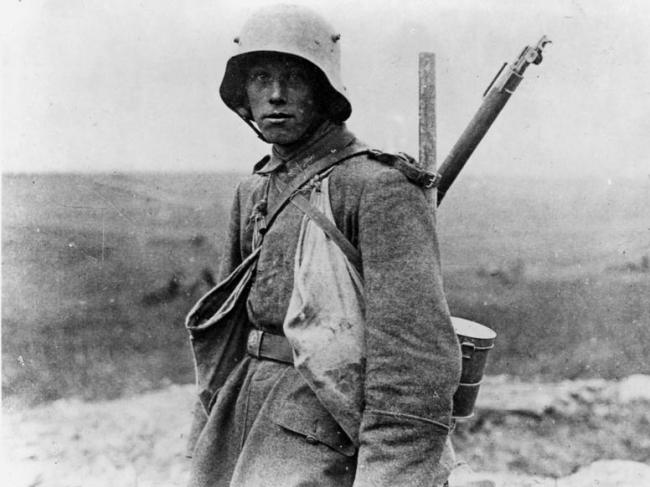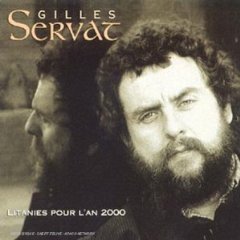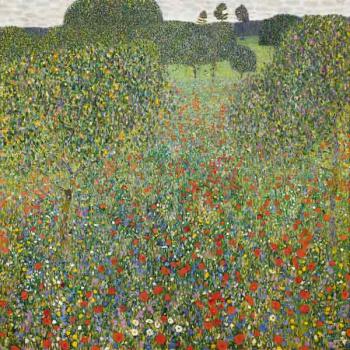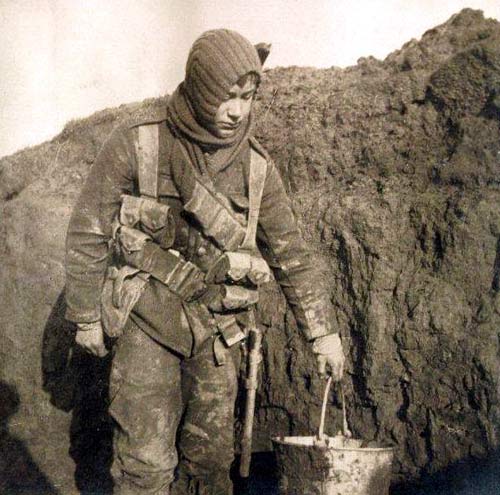Song Itinerary Poppie: an Antiwar flower?
In Flanders Fields
(1952)
Testo: John McCrae
Musica: Luc Wynants
Non è certo un caso che i papaveri rossi si ritrovino in tante e tante canzoni contro la guerra: tradizionalmente, nel mondo anglosassone, tali fiori sono dedicati alla memoria delle vittime sui campi di battaglia della prima e della seconda guerra mondiale. La cosa sembra risalire proprio a questa poesia di John McCrae, poi divenuta una canzone con la musica di Luc Wynants; ed è così, ad esempio, che in Gran Bretagna, nell' "Armistice Day", tutti portano un papavero rosso all'occhiello. Ma la cosa sembra risalire a ben più indietro nel tempo: si narra che Gengis Khan, l'imperatore e condottiero mongolo che conquistò il più grande impero che la storia abbia mai visto, portasse sempre con sé dei semi di papavero che spargeva sui campi di battaglia dopo le sue vittorie, in ricordo e rispetto di coloro che vi erano caduti, ed anche per "segnare", con il colore di quei fiori, che là si era svolta una battaglia.
(Riccardo Venturi)
Testo: John McCrae
Musica: Luc Wynants
Non è certo un caso che i papaveri rossi si ritrovino in tante e tante canzoni contro la guerra: tradizionalmente, nel mondo anglosassone, tali fiori sono dedicati alla memoria delle vittime sui campi di battaglia della prima e della seconda guerra mondiale. La cosa sembra risalire proprio a questa poesia di John McCrae, poi divenuta una canzone con la musica di Luc Wynants; ed è così, ad esempio, che in Gran Bretagna, nell' "Armistice Day", tutti portano un papavero rosso all'occhiello. Ma la cosa sembra risalire a ben più indietro nel tempo: si narra che Gengis Khan, l'imperatore e condottiero mongolo che conquistò il più grande impero che la storia abbia mai visto, portasse sempre con sé dei semi di papavero che spargeva sui campi di battaglia dopo le sue vittorie, in ricordo e rispetto di coloro che vi erano caduti, ed anche per "segnare", con il colore di quei fiori, che là si era svolta una battaglia.
(Riccardo Venturi)
In Flanders Fields the poppies blow
(Continues)
(Continues)
Southampton Dock

[1983]
Roger Waters
Album: "The final cut"
*Da/From View Images. Photo by Davis/Topical Press Agency/Getty Images.
Un'introduzione all'album si trova nel commento alla prima canzone, The Post-War Dream.
Roger Waters
Album: "The final cut"
*Da/From View Images. Photo by Davis/Topical Press Agency/Getty Images.
Un'introduzione all'album si trova nel commento alla prima canzone, The Post-War Dream.
"Southampton Dock" is a song from Pink Floyd's 1983 album, The Final Cut. While never performed live by the band, it has often been featured in Roger Waters's live shows, most often in a medley with "Get Your Filthy Hands Off My Desert," also from The Final Cut. It was featured in such a medley in Waters's live DVD In the Flesh Live. The song was also played on Waters' 2006-2007 The Dark Side of the Moon Live tour.
en.wikipedia
en.wikipedia
They disembarked in '45
(Continues)
(Continues)
Contributed by Riccardo Venturi
Song Itineraries:
Poppie: an Antiwar flower?
Felder von Verdun
Anonymous

Die "Felder von Verdun" stammen meines Wissens aus den sechziger Jahren, beschäftigen sich jedoch mit dem 1. Weltkrieg. Kein anderes Schlachtfeld sah mehr sterbende Soldaten als die französische Stadt Verdun. Verdun muß auch heute Mahnung sein. Die Forderung "Nie wieder Krieg!" ist angesichts des immer noch anhaltenden mörderischen Rüstungswettlaufs aktueller denn je.
La canzone "Felder von Verdun" (I Campi di Verdun) risale a mio parere agli anni '60, ma l'argomento tratta della prima guerra mondiale. Nessun altro campo di battaglia vide più soldati morti di quello attorno alla città francese di Verdun, nella Champagne. Il monito "Mai più guerra" è oggi più che mai attuale alla luce dei conflitti e dei massacri che ancora perdurano.
Si notino i campi di grano e i papaveri rossi...
(Riccardo Venturi)
La canzone "Felder von Verdun" (I Campi di Verdun) risale a mio parere agli anni '60, ma l'argomento tratta della prima guerra mondiale. Nessun altro campo di battaglia vide più soldati morti di quello attorno alla città francese di Verdun, nella Champagne. Il monito "Mai più guerra" è oggi più che mai attuale alla luce dei conflitti e dei massacri che ancora perdurano.
Si notino i campi di grano e i papaveri rossi...
(Riccardo Venturi)
Die Felder von Verdun, die tragen keine Ähren,
(Continues)
(Continues)
Contributed by Riccardo Venturi
Song Itineraries:
Poppie: an Antiwar flower?, World War I (1914-1918)
Children's Crusade
da The Dream of the Blue Turtles (1985)
English
Italiano
Français
"'Children's Crusade' is a fairly bitter song. The original children's crusade took place in the 11th century and two monks had the great idea of recruiting children from the streets of Europe and telling them that they were going to be an army to fight for Christ in Palestine, and to fight the Saracens. The intention all along was to sell them as slaves in Africa. And that's what they did; they recruited thousands of children and sold them as slaves. It seemed a very wonderful symbol of cynicism and the perversion of youthful idealism. Having thought about this for awhile, I realized this wasn't the only children's crusade in history - there have been many. So I look for examples. And the examples in the song I used are the first World War, where millions of young men, Germans, French, English, were killed for reasons... (Continues)
English
Italiano
Français
"'Children's Crusade' is a fairly bitter song. The original children's crusade took place in the 11th century and two monks had the great idea of recruiting children from the streets of Europe and telling them that they were going to be an army to fight for Christ in Palestine, and to fight the Saracens. The intention all along was to sell them as slaves in Africa. And that's what they did; they recruited thousands of children and sold them as slaves. It seemed a very wonderful symbol of cynicism and the perversion of youthful idealism. Having thought about this for awhile, I realized this wasn't the only children's crusade in history - there have been many. So I look for examples. And the examples in the song I used are the first World War, where millions of young men, Germans, French, English, were killed for reasons... (Continues)
Young men, soldiers, nineteen fourteen
(Continues)
(Continues)
Contributed by Michele (Lecco)
Song Itineraries:
Poppie: an Antiwar flower?, World War I (1914-1918)
Désertion

[1996]
Paroles et musique: Gilles Servat
Testo e musica: Gilles Servat
Album: Litanies pour l'an 2000
A differenza del "Déserteur", in questa canzone l'atto di ribellione è visto in piena guerra. Ed anche qui, come nella "Guerra di Piero" e in "The Green Fields Of France (No Man's Land)", ci sono dei papaveri. Un fiore contro la guerra, verrebbe da dire. [Commento originale di RV alla primitiva raccolta delle CCG, 2003.]
J'ai écrit Désertion sans penser vraiment à la guerre de 14. Ou alors à ses débuts, avant les tranchées. Mais c'est vrai que c'est plutôt marqué par cette guerre que par celle de 40. Ou même peut-être par celle de 1870, car j'ai certainement été influencé par Le dormeur du val de Rimbaud.
(Gilles Servat)
Paroles et musique: Gilles Servat
Testo e musica: Gilles Servat
Album: Litanies pour l'an 2000
A differenza del "Déserteur", in questa canzone l'atto di ribellione è visto in piena guerra. Ed anche qui, come nella "Guerra di Piero" e in "The Green Fields Of France (No Man's Land)", ci sono dei papaveri. Un fiore contro la guerra, verrebbe da dire. [Commento originale di RV alla primitiva raccolta delle CCG, 2003.]
J'ai écrit Désertion sans penser vraiment à la guerre de 14. Ou alors à ses débuts, avant les tranchées. Mais c'est vrai que c'est plutôt marqué par cette guerre que par celle de 40. Ou même peut-être par celle de 1870, car j'ai certainement été influencé par Le dormeur du val de Rimbaud.
(Gilles Servat)
Il enleva ses vêtements de fer
(Continues)
(Continues)
×
![]()




Testo di Fabrizio De André
Lyrics by Fabrizio De André
Paroles de Fabrizio De André
Musica di Fabrizio De André e Vittorio Centanaro
Music by Fabrizio De André and Vittorio Centanaro
Musique de Fabrizio De André et Vittorio Centanaro
La guerra di Piero ha oramai oltre cinquant'anni; e non solo ricantandola, ma semplicemente rileggendola, sorge spontanea una domanda: ma se questa canzone fosse stata scritta in una lingua di circolazione un po' più larga dell'italiano, dove sarebbe? Probabilmente nelle menti e nei cuori di tutto il mondo. Per questo, anche per farla conoscere meglio, continueremo a cercare di darne il maggior numero di versioni possibili nelle varie lingue.
La canzone ha dei probabilissimi echi provenienti da una celebre poesia di Arthur Rimbaud, Le dormeur du val (L'addormentato nella valle). Si veda a tale riguardo questo articolo di Giuseppe Cirigliano.
La... (Continues)